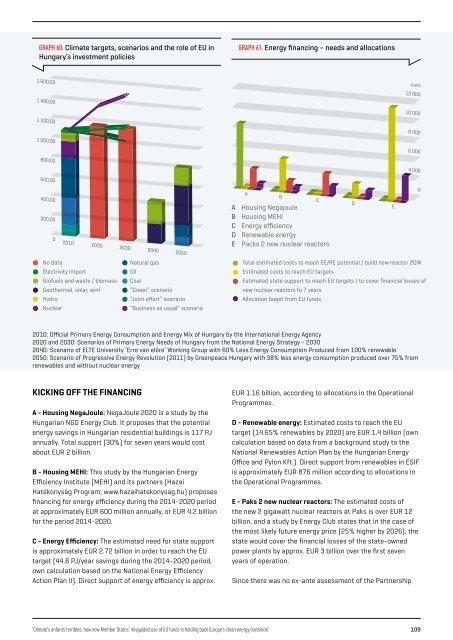ENFANTS TERRIBLES
enfants-terribles
enfants-terribles
You also want an ePaper? Increase the reach of your titles
YUMPU automatically turns print PDFs into web optimized ePapers that Google loves.
GRAPH 60: Climate targets, scenarios and the role of EU in<br />
Hungary’s investment policies<br />
GRAPH 61: Energy financing – needs and allocations<br />
1 600,00<br />
euro<br />
12 000<br />
1 400,00<br />
10 000<br />
1 200,00<br />
8 000<br />
1 000,00<br />
6 000<br />
800,00<br />
4 000<br />
600,00<br />
0<br />
400,00<br />
200,00<br />
0<br />
2010 2020 2030 2040 2050<br />
A B C D E<br />
A Housing Negajoule<br />
B Housing MEHI<br />
C Energy efficiency<br />
D Renewable energy<br />
E Packs 2 new nuclear reactors<br />
No data<br />
Electrivity import<br />
Biofuels and waste / biomass<br />
Geothermal, solar, winf<br />
Hydro<br />
Nuclear<br />
Natural gas<br />
Oil<br />
Coal<br />
“Green” scenario<br />
“Joint effort” scenario<br />
“Business as usual” scenario<br />
Total estimated costs to reach EE/RE potential / build new reactor 2GW<br />
Estimated costs to reach EU targets<br />
Estimated state support to reach EU targets / to cover financial losses of<br />
new nuclear reactors fo 7 years<br />
Allocation buget from EU funds<br />
2010: Official Primary Energy Consumption and Energy Mix of Hungary by the International Energy Agency<br />
2020 and 2030: Scenarios of Primary Energy Needs of Hungary from the National Energy Strategy - 2030<br />
2040: Scenario of ELTE University ‘Erre van előre’ Working Group with 60% Less Energy Consumption Produced from 100% renewable<br />
2050: Scenario of Progressive Energy Revolution (2011) by Greenpeace Hungary with 38% less energy consumption produced over 75% from<br />
renewables and without nuclear energy<br />
KICKING OFF THE FINANCING<br />
A - Housing NegaJoule: NegaJoule 2020 is a study by the<br />
Hungarian NGO Energy Club. It proposes that the potential<br />
energy savings in Hungarian residential buildings is 117 PJ<br />
annually. Total support (30%) for seven years would cost<br />
about EUR 2 billion.<br />
B - Housing MEHI: This study by the Hungarian Energy<br />
Efficiency Institute (MEHI) and its partners (Hazai<br />
Hatékonyság Program, www.hazaihatekonysag.hu) proposes<br />
financing for energy efficiency during the 2014-2020 period<br />
at approximately EUR 600 million annually, or EUR 4.2 billion<br />
for the period 2014-2020.<br />
C - Energy Efficiency: The estimated need for state support<br />
is approximately EUR 2.72 billion in order to reach the EU<br />
target (44.6 PJ/year savings during the 2014-2020 period,<br />
own calculation based on the National Energy Efficiency<br />
Action Plan II). Direct support of energy efficiency is approx.<br />
EUR 1.16 billion, according to allocations in the Operational<br />
Programmes.<br />
D - Renewable energy: Estimated costs to reach the EU<br />
target (14.65% renewables by 2020) are EUR 1.4 billion (own<br />
calculation based on data from a background study to the<br />
National Renewables Action Plan by the Hungarian Energy<br />
Office and Pylon Kft.). Direct support from renewables in ESIF<br />
is approximately EUR 876 million according to allocations in<br />
the Operational Programmes.<br />
E - Paks 2 new nuclear reactors: The estimated costs of<br />
the new 2 gigawatt nuclear reactors at Paks is over EUR 12<br />
billion, and a study by Energy Club states that in the case of<br />
the most likely future energy price (25% higher by 2026), the<br />
state would cover the financial losses of the state-owned<br />
power plants by approx. EUR 3 billion over the first seven<br />
years of operation.<br />
Since there was no ex-ante assessment of the Partnership<br />
‘Climate’s enfants terribles: how new Member States’ misguided use of EU funds is holding back Europe’s clean energy transition’ 109


